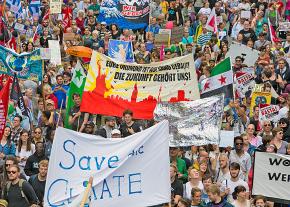Was the G20 protest a sign of future struggles?
The major mobilization against the recent G20 summit in Germany earlier this month offers hope for a revival of mass protests, writes , of the Die LINKE Berlin Internationals group and a member of marx21, in an article first published at Red Flag.
THE INTERNATIONAL anti-capitalist movement is back on the streets. On July 8, 76,000 people demonstrated against the G20 summit in Hamburg, Germany--the largest such mobilization in at least 10 years.
Many people did everything possible to prevent such a large gathering, not least Hamburg police head of operations Hartmut Dudde. Planned campsites in the town center were closed, demonstrations were banned for no reason, and the media were filled with ominous talk of violent protesters. But the responsibility for any violence lies elsewhere: there was a festival atmosphere in Hamburg until a peaceful demonstration was attacked by police water cannons.
This was recognized by the media, many reports blaming aggressive policing for the small amount of violence that eventually did take place. Public broadcaster Norddeutscher Rundfunk issued a statement saying, "Several NDR reporters on the ground report unanimously that initially no violence came from the demonstrators."
Axel Schroeder, a reporter for the national radio station Deutschlandfunk, clearly stated that the violence was started by the police, and the popular Panorama program spoke of a legitimate protest being systematically and unconstitutionally attacked.

The police aggression was aimed not just at the so-called black bloc. Parliamentary observer Norbert Hackbusch and even reporters from the right wing Bild newspaper were attacked by the police.
This has made it very difficult for the media and chancellor Angela Merkel's Christian Democratic Union government to whip up hatred against left wing demonstrators--though self-promoting Social Democrat MP Heiko Maas has used the opportunity to call for "Rock against the left" concerts.
THE REAL story of the weekend was not violence, but the massive demonstration on Saturday afternoon. Welcomed by locals--who hung self-made banners against the G20 from nearly every house--the demonstration was broad and colorful and untroubled by the small police presence on most of the route.
Why was Hamburg different from most recent international summits? Since the wave of massive demonstrations at international meetings of the ruling class--roughly between the IMF summit in Seattle in 1999 and the G8 summit in Heiligendamm, East Germany, in 2007--our side has not been able to organize a protest of the same degree. Until now. I think there are a few different things that contributed to Hamburg's success.
First, there was the presence of Donald Trump--his first appearance on German soil. Trump's election has helped mobilize a new generation of activists. It took only an online petition earlier this year to force him to cancel his planned visit to Great Britain for fear of mass demonstrations. In Germany, every event--from inauguration day to Ivanka Trump's attendance at the G20 women's conference in Berlin--has been met by significant protests.
But it wasn't just about Trump. Banners and slogans on the demonstration were equally enraged by other attendees of the summit--from Recep Tayyip Erdoğan and Vladimir Putin, to corrupt leaders of countries in the global South, such as South Africa's Jakob Zuma and Brazil's Michel Temer.
Second was the remarkable arrogance of the hosts--from Dudde and Merkel to the distasteful SPD-Green local government in Hamburg. For the last 10 years, most large ruling class meetings have been held on remote islands or in isolated fields, hundreds of miles from where anyone lives. The G20 summit took place in the Hamburger Messehalle. This is not just in the town center, but borders the Karoviertel and Schanzenviertel--which have been the center of the solidarity movement with the Lampedusa refugees for the last few years.
Finally, it is not only Trump and Erdoğan who have profited from the collapse of the political center. The different experiences of SYRIZA and Podemos in Greece and Spain and Jeremy Corbyn and Bernie Sanders in Britain and the U.S. have shown that there is a new layer of activists who are not just intellectually attracted to socialism, but are prepared to go onto the streets to fight for equality and democracy. This is what we experienced in Hamburg on July 8.
In the days before the demonstration, there was a counter-summit attended by 2,500 people. Like many political events at the moment, it was simultaneously diverse, confused and vibrant. At the closing meeting, speakers including Samir Amin and Srecko Horvat discussed whether it is the time to form a new socialist international. Our international movement is beginning serious discussions about how we best organize ourselves.
It is too early to measure the importance of the protests in Hamburg. But we may look back at this being a significant event. Large numbers of people believe that capitalism cannot carry on in the same way, and are desperate to come together and organize a collective response. Hamburg is most certainly not the final event in this process, but it may be a catalyst to something much bigger.
Let's hope so.
First published at Red Flag.


